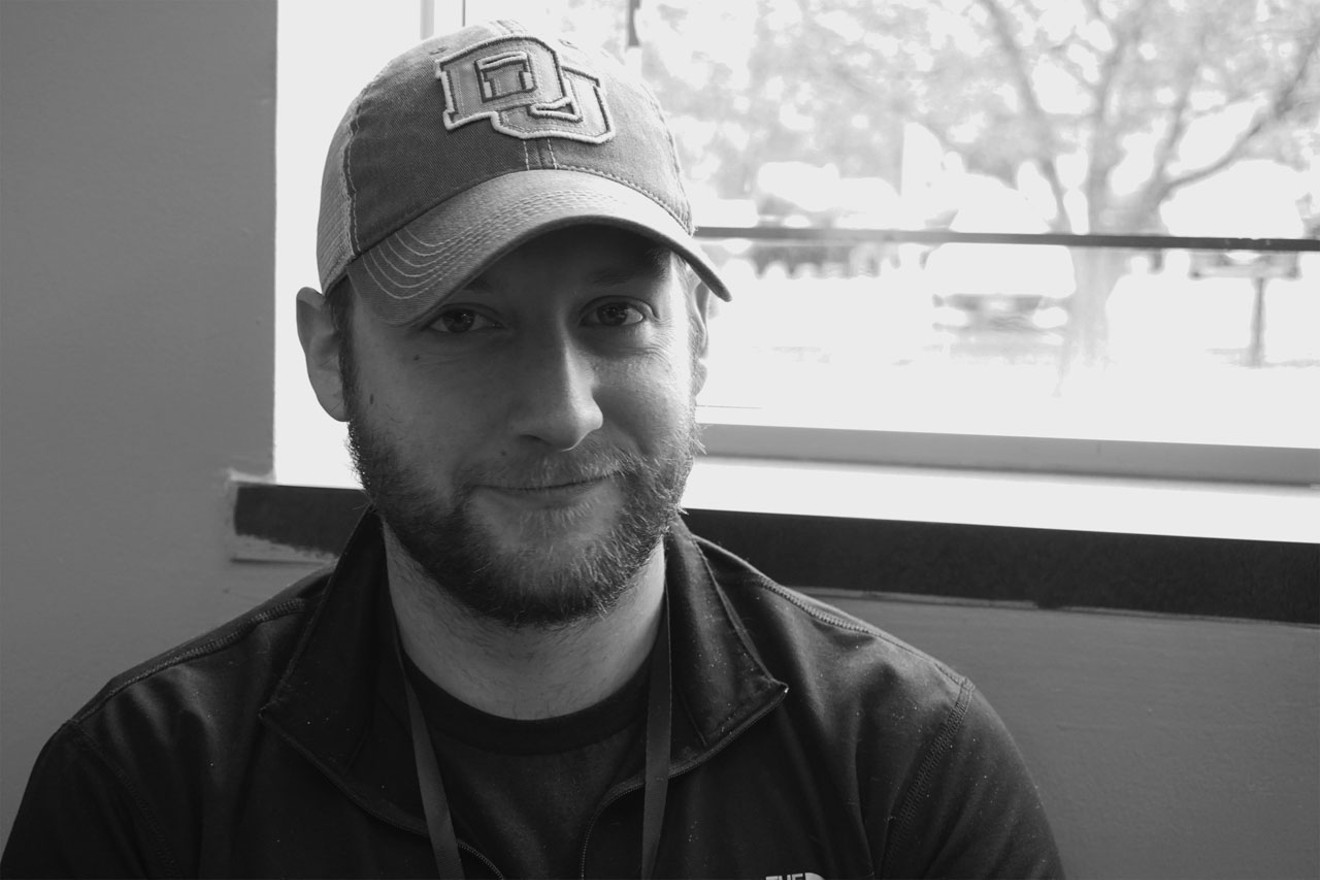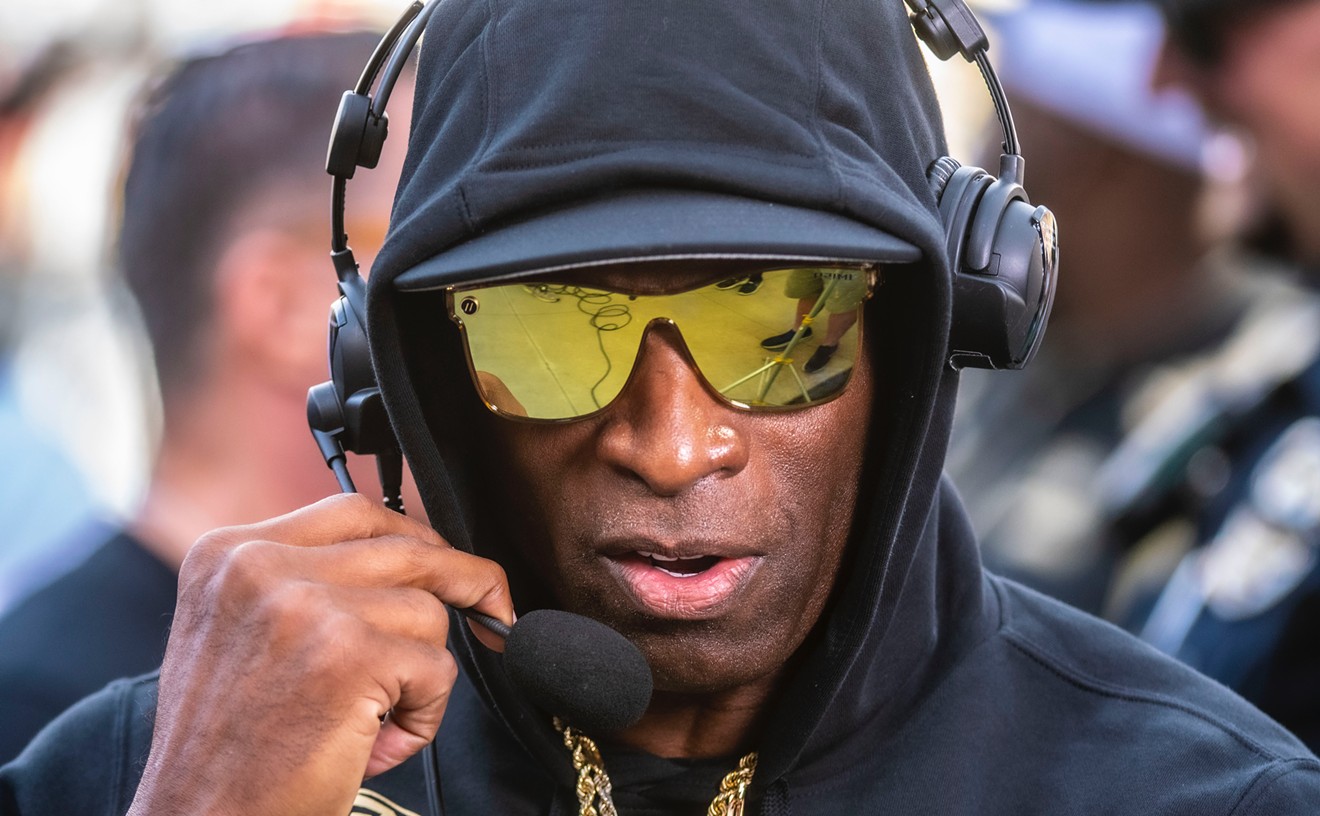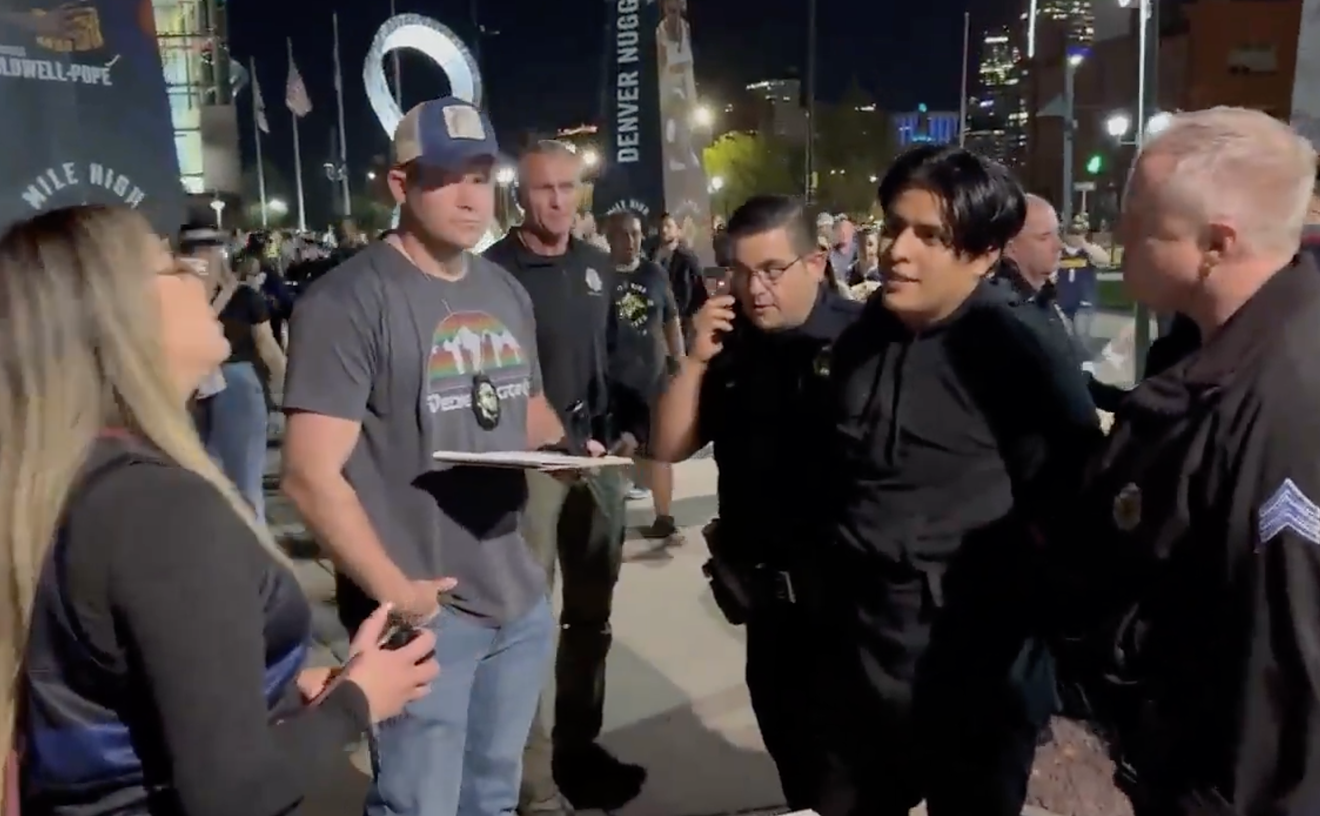5280 High School is a project-based learning school in Denver; during project-based learning, students do the real-world work of professionals. In the case of “Sharing Their Stories,” it was the work of journalists. For this project, students in Cody Miller’s ninth-grade humanities class interviewed and photographed veterans to capture their experiences and share them for Memorial Day.
Former Intelligence Captain Brenden Konczal was born in Lenexa, Kansas, on August 21, 1985. His father was in the Air Force, so Konczal lived in Germany for two years as a child. Unlike many soldiers, he went straight from high school to college; while in college, he decided to join the military, but his parents asked him to finish school first. He spent nine years in the military; he was stationed in Hawaii, Florida and South Korea and was deployed to Afghanistan three times.
Konczal is currently working toward a master of arts from the Josef Korbel School of International Studies at the University of Denver. Students Tanaja Payne, Micah Wright, DaeVeon O’Bryant, Michael Montez and Marcos Parras conducted the following interview with Konczal at 5280:
5280 High School: What or who inspired you to join the military?
Brenden Konczal: I feel like you owe something back to, you know — you call it your country, you call it your people, you call it your neighborhood, you call it whatever it is. I felt like I owed something to people, and the way I could do that was through service.
Why did you choose to enlist in the Army instead of one of the other branches?
I was not interested in the Navy or the Air Force. ... I just knew that I didn’t want to be on a boat and I don’t like flying, so those were already out. I actually talked to the Marine recruiter and the Army recruiter. I was specifically going to be an officer, and the Army recruiter essentially was like, “Yup, we got a spot for you,” and I was signed up in a week. The Marines actually took too long to call me back; they called me back when I was halfway through my Officer Candidate School. … After that, I had 18 to 24 months of training as an Intelligence Officer, which was my specialty.
Where did you receive basic training?
I went to basic training at Fort Jackson, South Carolina.
What are some memories from basic training?
It’s just a lot of getting yelled at and standing in line: Hurry up and wait. Pretty much they just want to see what you can do when you’re tired and stressed and they want to train you to be tired and stressed so you can do things when you’re tired and stressed. It’s not as hard as everyone says it is.
What was your drill instructor like?
You have a couple. Their job is to give you the basic knowledge to work in a team. Basic training was different for me compared to a lot of people because of my path in the military. A lot of people who go to basic training are straight out of high school and don't have any real-world experience. That's not saying they’re good or bad, it’s just not something you have. Basic training not only teaches you basic Army skills, it also provides a window into different parts of the world.
Who is one of the most interesting people you met in basic training?
Honestly, basic training is not that interesting. I've deployed three times to Afghanistan, and I've met way more interesting people. Afghan generals; guys from Qatar, Britain, New Zealand; Australian military personnel, and the Afghan government. I’ve met the different secretaries of state. Those are the more interesting people. Basic training, it’s a bunch of lame individuals like me just kinda hanging out with each other.
Where were you stationed?
I’ve been stationed in Hawaii, Florida and Korea.
What did you do when you were stationed there?
Being stationed is like your home base and then you deploy and do your job from your home base. When I was in Hawaii and Florida, I would train to deploy to Afghanistan. Then in Korea I had two jobs, but the main job I had was Company Commander of the Strategic Intelligence Unit; we watched North Korea and monitored them.
What is it like to live on a military base?
I kinda like it. All the services are right there, provided for you. I encourage people, especially if you’re living in a foreign country, to go out and explore a little bit. At the same time, it’s nice to walk outside your home and essentially have everything you need right outside your doorstep.
What was it like being stationed in Hawaii?
It’s nice: good weather pretty much all the time, you do get a little bit of island fever. I’m from Kansas and it’s an eight-hour flight home, so there’s that. You can do whatever you want for free in Hawaii for the most part, as long as you find it. You can go surfing, go swimming. You don’t have to spend too much money if you don’t want to.
What did you do in South Korea?
For my first job, I was an assistant S-3, an Operations Officer, so I just planned how the unit went about its everyday business: how it functions, what time do people show up to PT formation, how do we move from point A to point B. Then I also served on the team that plans what happens if North Korea attacks tomorrow. My unit specifically was in charge of the All Source: It’s called a Dark Team, like the response team where we can set up an emergency operations center. I had that job, but really what I was doing was preparing to be a company commander. So then I took command of a Strategic Intelligence Unit where we worked with South Koreans on cyber operations and signals intelligence. We essentially looked at North Korea and we could tell you when they were launching missiles, what type of missiles they were launching, who they were talking to, and how they were talking to people. I also had three four-man teams that lived on the demilitarized zone between North and South Korea.
What did you do in Afghanistan?
My first deployment to Afghanistan, I was a Battalion Intelligence Officer; that's where I did the hunting of IED emplacers and planning operations. My last two times around, I was with Special Forces. My second-to-last deployment, I was the intelligence detachment commander. You have your Special Forces unit and then there’s a small group of intelligence guys who separate and work with the smaller units and do the collection. Then there's another piece that does the analysis in the back end. I was in charge of the collection and analysis piece. The third deployment, I was with the same unit, but I was the Intelligence Officer for that Special Operations Task Force, doing more of the finding IED emplacers and planning more of the joint operations, as well as going to way too many meetings. It’s mostly meetings. It sounds cool, but it’s mostly meetings.
What was a typical thing you did throughout the day?
One of my fields of expertise is targeting. For my first deployment, one of my jobs was to find IED emplacers. I set up essentially different systems and internal programs to monitor and track where guys were emplacing IEDs across the battlespace. Based on their patterns of life and the way they moved around the battlefield, I was essentially able to predict when and where they were going to be at certain times during the day and kill or capture them.
How did you communicate with your family while you were deployed?
The first time I deployed, we lived in a plywood box, but I had a satellite phone because of my position; a lot of people didn't. If there were any extra minutes that weren’t going to be used, we might divvy those up to talk to some of the guys back home. At one point, we got a satellite and we bought satellite time to be able to communicate via the internet. It wasn't any good, but we could call back about once a week for about five to ten minutes or so. My last deployment, I had internet in my room...it was definitely heaven-sent.
Is there any other specialty that you would’ve joined besides intelligence?
I was very close to joining Infantry, probably because of pride. I knew myself well enough to know that I’d do better as an Intelligence Officer than I would as an Infantry Officer. Intelligence is kind of the like weatherman: Everyone thinks they can do it, but you are going to be right only 30 percent of the time, anyway. You get the autonomy to explore and make your own decisions versus the other specialties, which are very much like: this is what the book says, so you will do it this way and you can’t deviate. So, that’s why I picked Intelligence.
Did you make any close friends while you were in the service?
I met two guys I would consider relatively close. I'm getting married this summer, and they’re going to be in my wedding. They worked with me for years when I was with my last unit.
What are your most memorable experiences from the military?
For me, it's mostly about the relationships I made. I was in charge of a lot of different soldiers and I worked with a lot of different people and the mission can be very exciting at times. The things that you miss when you leave are definitely the guys that you worked with.
What was an exciting experience while you served?
I remember working with another agency, the Drug Enforcement Agency, where we were looking at a bunch of different drug operations. It was in Afghanistan and after about a month and a half of planning or so, looking at one specific target, we had a couple of rough goes at it. We finally found 88,000 pounds of drugs on an objective. After a month of good, long, hard work, we actually had some pretty good success.
What are some awards you got while in the military?
l have three bronze stars, which would be my highest awards. I also have a couple of Meritorious Service Medals, which are kind of like non-combat-time bronze star equivalents. And then I have a couple of lesser awards that most people get. I’m also airborne-qualified; not everyone jumps out of planes, but I did that for a few years as well. Which I would not recommend doing, because I hate flying and I hate heights.
You had to change your operation procedures after the Edward Snowden leaks and Chelsea Manning’s Wikileaks cooperation. Talk about that.
We have regular internet and then there is the government internet; the government internet is separate. Chelsea Manning went on the government internet and pulled off a bunch of secret classified information and gave it to Wikileaks. When she did that, the Army, of course, is going to react. The ability for me to move information between the systems immediately became more difficult. I believe one of the things she did was download a bunch of that stuff to CDs and USB drives to upload it. I was no longer able to use CDs and USB drives: For an Intelligence Officer who has huge amounts of data, being able to move that between systems is pretty important. I don't think people understood the second- and third-order effects of those decisions that they have made, and how it affects people on the ground. And then I had other programs I can't really tell you about specifically, but I had things that were canceled because of the information that was exposed, exposed part of the programs I needed. In order to complete my mission of finding IED emplacers, I had programs that were removed and I could no longer use because they were exposed and at risk. Little things like that.
Talk about your last duty station in Destin, Florida, with the 7th Special Forces Airborne.
Special Forces Units are kind of cool because they're still a part of the Army, but they're a little bit separate. It’s just a different mentality, a different attitude. So your last days are just kind of coming in and getting all of your paperwork lined up and ready to go. Getting out of the military is not hard, it really isn’t. I was more concerned that I had just taken all of my placement exams for my master's degree program. I was getting set up to move out here to Colorado versus concerned with, you know, leaving the unit.
When did you leave the military?
April 1, 2018.
Talk about the day you left the service.
The day I left the service I had to drive from Destin, where I was stationed on an Air Force base, and drive to Fort Rucker, Alabama, which is an hour and a half north. You have to sign a bunch of paperwork that says, "Hey, I’m leaving today," and they essentially sign you out of the Army, just like you would sign out of the office if you’re going home early from school.They give you a bunch of paperwork and that’s it. They slap you on the butt and say get out there and be somebody.
Were you excited to be going home?
Excited and nervous at the same time. I compare the Army to this: you have a bunch of things that are done for you, a lot that you don’t think about. For instance, health insurance. I joined the military before I learned how to take care of my own health insurance because I went from college to the military. And then the whole health-care act was passed. There are two different worlds: On the civilian side I never had to deal with that.
How did the service affect your daily life?
I think it’s dependent on what you did in the service. I think it made me more aware. I really learned to think. I believe I was a critical thinker already, but the military taught me to be a bigger critical thinker. I find myself doing that pretty much in all aspects of my life outside of the military now. Even going to the store, I make a plan about what I’m going to do. When I’m going to walk to the store, what I’m going to pull off the shelf, and if I don’t see this, what’s my backup? That’s probably something the military has ingrained in me.
How did you change after coming out of the service?
I’ll tell you a story. It was actually after my first deployment, in Hawaii. I was deployed to Afghanistan and I flew all the way home to surprise my mom back in Kansas, which every soldier wants to do. I wasn’t making a video or anything like that, but I wanted to surprise her. As an officer, I’m so used to talking to soldiers and saying, “Hey, is that a gray sweater?” And all I’m used to hearing is “Yes sir” or “No sir.” We have one of those little buttons you can use on the garage door to get in: battery's dead. Growing up, we always had a hide-it key in the back yard, so I called my mom up and said, “Hey, Mom, is the hide-it key still in the back yard?” And her first response was, “Why do you need it?” I said, "Well, I’m locked out of the house,” and then her next response was, “Well, how did you manage that?” And that was the moment: That’s when I knew that I was different, because I wanted to take my phone and throw it across the yard because I was so used to hearing "yes" or "no." I think maybe patience is a bigger word for it. My patience was a little less.
Was it hard for you to transition back into civilian life?
It hasn’t been too difficult for me; I have friends where it’s been more difficult. You just have to remember sometimes that not everyone is built to do exactly what you say at all times. So just remember that getting asked "Why?" is an appropriate thing to happen.
What did you decide to do after the Army?
I am currently getting my master's degree at the University of Denver in International Studies. I’m probably going to work maybe not for the government, but in that type of field again since I was an Intelligence Officer for nine years. I’ve got a skill set that’s kind of specialized.
What would be a benefit of joining the military?
I had a lot of student debt coming out of college like most people do, and the military paid for most of that, which was nice. If you are smart about what job you pick in the military, it teaches you life skills so that you will have a guaranteed job coming out of the military. Personally, I’ve always had an appetite for new places, new things, so I’ve traveled extensively. I’ve been to Europe a couple of times, I was in Korea, I’ve visited Fiji and just places I thought I would never go in the world. So, that’s another thing. If you want to really travel, join the Navy. But if you join the other services, you’ll at least have the time afforded to you to do that.
Would you recommend the military to anybody?
I won’t say anybody, but I’ll say most people. I worked in the Intelligence branch, which is the only branch I probably could have survived in, just based on my personality. I do think it it’s a worthwhile experience.
Do you miss the military in any way?
Yes, I do. There is that sense of purpose when every day you know exactly what you’re supposed to do, and job satisfaction is very apparent when you achieve it.
Watch for other interviews by the students of 5280 High School with local veterans over Memorial Day weekend.
[
{
"name": "Air - MediumRectangle - Inline Content - Mobile Display Size",
"component": "12017618",
"insertPoint": "2",
"requiredCountToDisplay": "2"
},{
"name": "Editor Picks",
"component": "17242653",
"insertPoint": "4",
"requiredCountToDisplay": "1"
},{
"name": "Inline Links",
"component": "18838239",
"insertPoint": "8th",
"startingPoint": 8,
"requiredCountToDisplay": "7",
"maxInsertions": 25
},{
"name": "Air - MediumRectangle - Combo - Inline Content",
"component": "17261320",
"insertPoint": "8th",
"startingPoint": 8,
"requiredCountToDisplay": "7",
"maxInsertions": 25
},{
"name": "Inline Links",
"component": "18838239",
"insertPoint": "8th",
"startingPoint": 12,
"requiredCountToDisplay": "11",
"maxInsertions": 25
},{
"name": "Air - Leaderboard Tower - Combo - Inline Content",
"component": "17261321",
"insertPoint": "8th",
"startingPoint": 12,
"requiredCountToDisplay": "11",
"maxInsertions": 25
}
]











